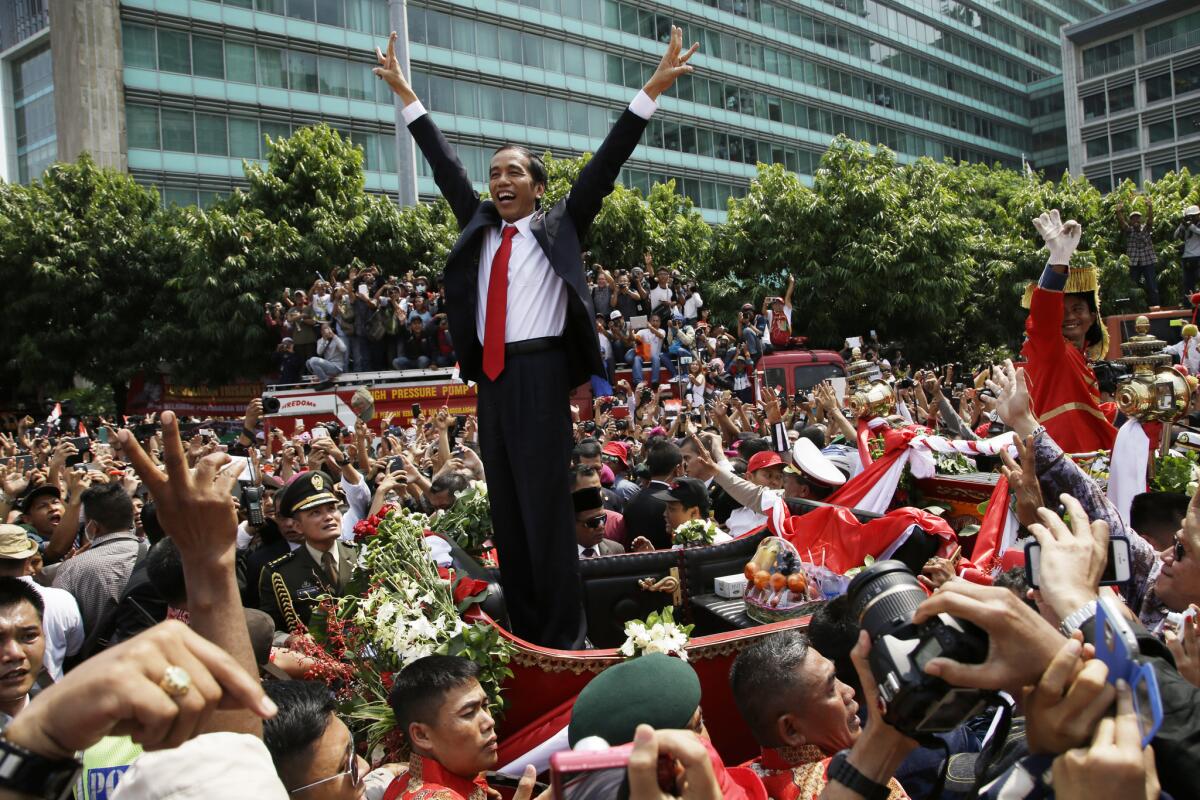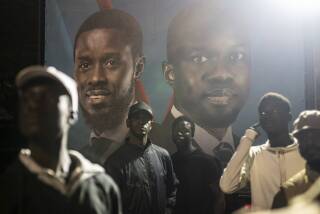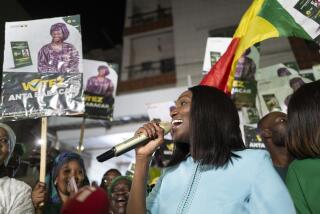Indonesia’s new president sworn in, calls for unity

After a bruising election campaign, former businessman Joko Widodo was sworn in Monday as president of Indonesia, becoming the first man from outside the country’s political and military elite to lead the world’s 10th-largest economy.
Tens of thousands took to Jakarta’s sun-scorched streets to hail Joko, widely known as “Jokowi,” who won the closest election since the Southeast Asian nation dispensed with a military dictatorship in 1998.
In his inaugural address at parliament, with U.S. Secretary of State John F. Kerry in attendance along with the heads of government from Australia, Malaysia and Singapore, Joko, 53, called for national unity and exhorted his 250 million compatriots “to move together, to work, work and work.”
A decade ago, Joko was selling furniture in Solo, his hometown in the center of Indonesia’s most populous island, Java. But his tenures as mayor of Solo and later as governor of Jakarta, the capital region, earned him national popularity, which he rode to a 6-percentage-point win over former Gen. Prabowo Subianto in July’s presidential election.
Prabowo refused to accept the result and has threatened to use his party’s 63% parliamentary majority to block Joko’s agenda for economic reform, including plans to reduce a popular fuel subsidy that takes up about a fifth of the national budget.
A leading source of rubber, palm oil, metals and coal, Indonesia has seen economic growth slip to about 5% annually in recent years as commodity prices dropped. Joko has said he believes that 7% growth is needed if Indonesia is to develop its economy beyond resource extraction and create enough jobs for its young population.
Last month, Prabowo won a vote to end Indonesia’s system of direct elections for local officials, which helped Joko get his start in politics in Solo nine years ago. The change has raised concerns about the future of democracy in a country usually lauded for its successful transition from dictatorship.
Joko visited Prabowo last week, their first meeting since the election, and mentioned him by name during his inauguration address. The former general stood and gave Joko a military salute — a sign, according to experts, that he was offering his rival at least temporary support.
U.S. officials praised Joko’s “reform-minded” stance and said they were eager to work with him on issues such as combating terrorism and the spread of the extremist group Islamic State, whose campaign in Iraq and Syria has attracted fighters from Southeast Asia. Indonesia is the world’s largest Muslim-majority nation but has not traditionally been a fertile ground for militant Islam.
“Indonesia’s a difficult country to govern, so he’ll have plenty of challenges,” said one senior Obama administration official who briefed reporters on condition of anonymity. “But if he can achieve even reasonable success in improving the quality of governance, it’ll be hugely important.”
Rizka Sherlyta, one of tens of thousands of volunteers who campaigned for Joko, said the new president came from outside the elite circles that have dominated the country’s politics.
“Jokowi is trying to bring a new kind of democracy to Indonesia, to change how the system works,” Rizka said, weaving among volunteers who were wearing cardboard Joko masks and handing out roses in central Jakarta.
Hoping to apply small-town policymaking tools to the national stage, Joko says he wants to modernize Indonesia’s infrastructure, attract investment in the manufacturing sector and reduce the nation’s reliance on selling raw materials.
The World Bank reported this year that although Indonesia has half the population of the entire 10-nation Assn. of Southeast Asian Nations, or ASEAN, it supplies only 15% of the bloc’s manufacturing exports, far behind countries such as Thailand. Indonesia has not recovered as well as neighboring countries from the Asian economic crisis of the late 1990s.
“While he has attracted plenty of plaudits for his clean style of government, he is untested at the national level and could struggle to push through critical reforms,” reported Capital Economics, a London research group.
Analysts say Joko may have to cut deals with the opposition and possibly offer Cabinet positions to members of Prabowo’s coalition. That could disappoint some supporters but also weaken resistance to his reforms, said professor Tim Lindsey, who directs the Center for Indonesian Law, Islam and Society at the University of Melbourne in Australia.
“Jokowi is a canny operator,” Lindsey said, “and has shown the ability to broker deals while leading minority governments as mayor of Solo and as governor of Jakarta.”
shashank.bengali@latimes.com
Special correspondent Roughneen reported from Jakarta and Times staff writer Bengali from Mumbai, India.
More to Read
Start your day right
Sign up for Essential California for news, features and recommendations from the L.A. Times and beyond in your inbox six days a week.
You may occasionally receive promotional content from the Los Angeles Times.







